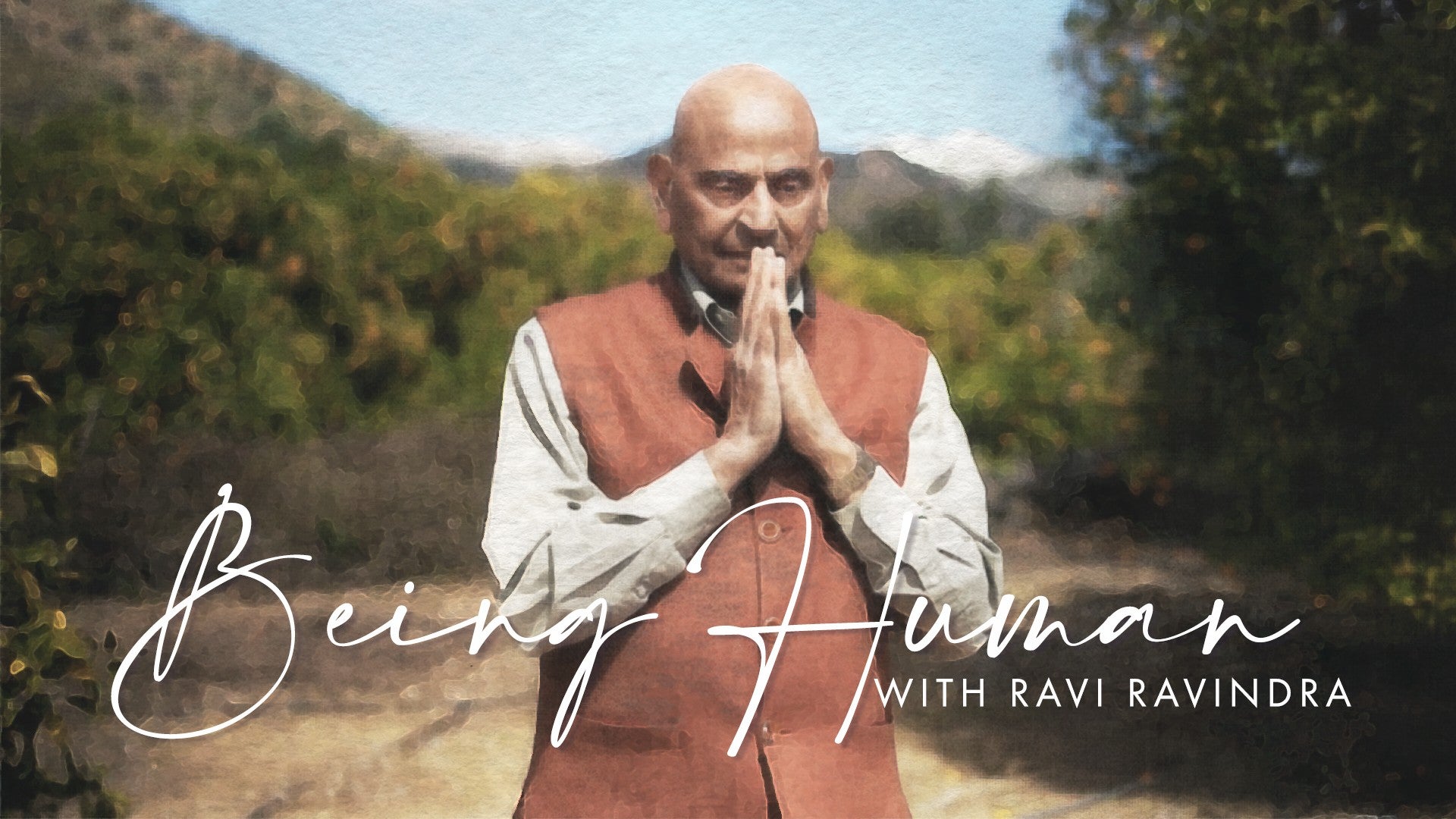Description
About This Video
Transcript
Read Full Transcript
Well, first of all, let me make a few general remarks about spiritual practice. Very strong suggestion from all the sages throughout human history, obviously in different languages because they are using different words, speaking to different people. The suggestion is that the entire universe is pervaded by subtle and conscious energies. Usually it's called God or Allah or Brahma or some other words like the absolute. But always the suggestion is that these are very subtle and conscious energies pervading the whole universe.
Secondly, that the manifested universe is created by these energies coming from the highest level. This is a perspective completely contrary to modern scientific understanding. Since the 16th, 17th century, in the scientific world, the notion has been that everything started from the lowest level of consciousness, from matter, and gradually somehow life comes to be and then consciousness emerges. But clearly, because of its connection with technology, especially after the end of the 19th century starting in Germany, science and technology has been very important for producing enormously important equipments. Even the fact that I am here from a long distance would not be possible without science and technology. So it's not a question of being against it, but we need to understand that in spiritual practice, the suggestion is that everything is coming from the highest level.
So the creation is by involution, not by evolution. Secondly, that obviously we can see this not only among human beings but with various creatures or even the rocks, that there are different levels of consciousness and that the call is every level in the universe. It's easier for us to see this in human beings, but they say every level of the universe is trying to evolve back to the source, to come back home. So that every person, I would now stay mostly with human beings, but every human being somewhere deep down wishes to evolve, to return back to God or back to the source. And that is why this element of the spirit takes on a body, because a body, I use the word body, but it includes the mind, that the body and the mind are required to undertake some action that can assist the evolution of the particle of divinity.
We may call it soul, sometimes it gets called spirit. To assist the evolution of my soul, my body is required. We have a very important remark by a great sage in India called Ishwar Krishna, who was the author of Sankhyakarika, which is the classical text in Sankhya, just like Patanjali is the author of Yoga Sutras. He makes this remark that spirit without the body is lame, and the body without the spirit is blind. So we need to understand that from a spiritual point of view, it's the spirit that has taken on the body.
It's not the other way around, that my body somehow got the spirit in it or the soul in it. And the body has been taken for its purpose, for the purpose of the spirit, or spiritual element, I should say. And then, very strong call that the spiritual practice of any kind is meant to enhance the quality of our being, meaning ultimately to come back to God. Now, that is very high level, and personally, I'm not so sure in the whole human history, more than very few people have actually come to that level, but that is the call. For example, repeated remark of the Buddha, look within, you are the Buddha.
And although these things don't get so much emphasized in the biblical tradition, but if there is time, I will happily quote to you from the remarks of Christ also, calling us to become one with God, or one with the Father, he would use that expression. And similarly, in the Vedic tradition, very strong call that deep down, our deepest self is identically the same as Brahma, which is the label for the highest reality. That is actually called the supreme identity in the Hindu tradition. So that is the call, but keeping in mind, that's very high. And even these great sages, for example, Christ makes this remark, many are called, but few are chosen.
Very few people actually achieve this, but that is the call. So we need to keep this in mind that the whole spiritual practice is to enhance the quality of my being. Now, what does it mean, the quality of my being? Do I have more sense of compassion, more sense of love, more sense of service, more sense of unity with other people, or am I just asserting myself? Therefore, one would realize that the whole spiritual practice is really to enhance the quality of the human person, to make us more and more human, which is the overall theme we are going to follow in these three talks here.
And of course, yoga practice is at its best one of the greatest spiritual practice enhanced anywhere in any culture. So I will therefore focus all of my three talks, in fact, on the yoga sutras, because practitioners of yoga need to realize that what they are actually trying to practice is very much the whole idea is to enhance the quality of our human being. And let me now take, first of all, the first sutra in the second chapter of Patanjali's Yoga Sutras, which basically says, I may end up using some Sanskrit words, but I will translate them, because it is not easy to have one single English word translating the appropriate Sanskrit word, but one can come closer and closer to it. So the first sutra in the second chapter actually says that the activities of yoga consist of three things. One is, in Sanskrit the words are tapas, swadhya, and isvar pranidhan, more or less meaning self-discipline, self-study, and submitting to God.
That these are the ways to enhance the quality of our being. And so let me take a few moments to speak about each of these three things, because these are the important three remarks made by Patanjali in the Yoga Sutras. Also I should make a general remark here, that in the first chapter there is more, for example, the first substantial sutra, which is the second sutra in the second chapter. Yoga is stopping all the movements of the mind. But in the second chapter it is much more positively expressed, which is actually the second sutra in the second chapter, that yoga is for cultivating samadhi and for diminishing the hindrances.
I will come back to that maybe in my second talk, but the first one I just want to speak about, the specific practices suggested by Patanjali, which I just mentioned. Self-inquiry, or self-discipline, self-inquiry, and submission to God. Now self-discipline would seem rather an obvious thing, that within each one of us we can make very good decisions, or New Year's resolutions, but then the body is not always willing to carry those out. Or even within the society there are some people who have higher wisdom, have higher compassion, but some people don't. So it is useful that in the society also, that the higher being, but we can look at it individually, that within me, whatever is the level of higher being, sometimes my mind can understand something, or my spirit is touched by something, how can it discipline my body, which has to actually carry out the action?
Self-discipline does not mean self-torture. This is important to really understand this, because sometimes one has this kind of a tendency. But the important thing is, of course, self-discipline may sometimes mean, that if I undertake to do something and I am unable to do it for whatever reason, well, maybe then I won't put sugar in my coffee next day. So discipline can sometimes require, as if I need to either praise my body for giving it more what it wants, or to punish my body for depriving it of something what it wants. But that doesn't mean in any sense to torture the body.
This is why Krishna, for example, in the Bhagavad Gita, actually explicitly says that, I am actually quoting this, this is in the 17th chapter of the Bhagavad Gita, that those who undertake severe austerities torture not only themselves, they torture me, Krishna says, who is seated in their body. So no spiritual practice is actually recommending severe austerities, but it's always a tricky matter for each one of us to decide what becomes a severe austerity, and what is it just depriving myself of, if I am addicted to coffee, for example, that maybe if I don't carry out my whatever project I have undertaken, then maybe I won't have coffee for next day or next week if necessary. So it's a question of not giving into severe austerities, but disciplining oneself. So to me it seems self-discipline is really rather an obvious requirement. I have Patanjali mentions this specifically.
Now self-study is an extremely important practice, because I need to know what stands in my way, and also deep down what calls me. One should not always imagine that I'm always at the same level. I think, I imagine that each one of you would agree with me. In my own life I can easily and quite rightly say, sometimes I'm completely self-centered, self-occupied, but occasionally, much to my surprise, I end up doing something quite selfless. So one is not always at the same level.
Question is, can I stay at the level of selflessness more frequently and more steadily? Because the whole world, I'm hardly saying anything new, this is actually a remark of Christ in the New Testament, that the whole world is driven by the prince of darkness. What do they mean by this? Fear and desire, that is running the whole universe. Approval, disapproval, earning and spending, that's what carries on.
So the call therefore is not to be necessarily against any of this, but to see that what in me actually is called by something spiritual, how frequently does it get called, and how can I nourish it? How can I engage with this? So in fact there is a remark of Krishnamurti very strongly saying, there can be no wisdom without self-study. Sometimes the word is used self-inquiry or self-knowledge or self-observation, so don't get stuck on one word here, but it is really to do impartial investigation of what I am, what it is that I wish, how do I spend my time and my energy, that is really the self-study. But Krishnamurti's remark, as I just mentioned, that there can be no wisdom without self-study.
And those of you who have read the Yoga Sutras, swadhya literally means self-study. And it is strongly recommended, as I just quoted to you in the second chapter, first sutra, and later on when he speaks about yam and niyam, meaning observations or hindrances, again this is mentioned, these three things are mentioned again, swadhya, or before that, self-discipline, tapas, and also the ishvar pranidhan. So self-study is an extremely important requirement, there can be no question about this. And sometimes I think some of these things don't get emphasized in every teaching, but let me remind you here, in one of the non-canonical gospels, this is Gospel of Thomas, this is a remark of Christ, I am just quoting it from memory, Kingdom of God is within you and outside you, if you would know yourself then you will be known, then you will realize that the whole, that you are the children of the living father. If you don't know yourself, then you are in poverty, in fact you are poverty.
It's such a strong statement, this is the Gospel of Thomas, you can take my word for it. Because self-study is absolutely necessary for the obvious fact that I need to know what is standing in my way, what my deepest wish is, and then one begins to see that whatever I call myself has actually many levels. There is the usual, which is mostly superficial level of myself, which is running most of my life, but there is also a deepest level in me, which occasionally, particularly in moments of either great sorrow, for example if a close friend dies, one then wonders, what the hell am I doing in my life? How many decades do I have left to live? Or also moments of great joy actually, if you see a baby just being born or a little kid just playing quite remarkably doing this and that.
So feeling is said by all the great sages as the first avenue to truth, not thinking. In fact, it's very interesting that the mind is actually a hindrance. In fact, very strong remark of Madame Blavatsky, the founder of the Theosophical Society, that the mind is the slayer of the truth. A very strong remark actually. So this is the reason why in every spiritual practice, there is very much emphasis that there are many levels of reality subtler than the mind.
For example, that is almost the meaning of something being spiritual actually. But spiritual realm is very large. In the Bible you have nine orders of angels. They're all spiritual, but at very different level. And so to keep in mind that there are many levels of reality subtler than the mind and that the mind cannot grasp it, which is why, of course, one doesn't need to be against our theologians or philosophers, but guaranteedly from a spiritual point of view, they cannot connect with the highest reality.
No mental description can be given. In the Upanishads, a very strong suggestion coming, neti, neti, not this, not this. Any description is not suitable. Similarly, Christ refuses to describe what is the kingdom of God. On one occasion he says, it's like a mustard seed.
Now if you feel that is very clear, you can tell me what it means to you. Or the Buddha, for example, refuses to describe what nirvana is. So even these greatest sages, I'm talking about some of the greatest sages here, or Krishna in the Bhagavad Gita doesn't describe what ultimate Brahma is, unable to describe. So these cannot be described simply because the mind is trying to make some description or the other and the mind cannot capture it. But there is no reason to be against philosophy or theology or any kind of knowledge.
But the call in spiritual endeavor is to actually experience something. If some knowledge assists you, that's fine. But they're not so much interested in knowledge. They're more interested in the quality of their being. And to have the quality of one's being requires an experiencing something.
But there is nothing there against in the spiritual realm. In fact, if you actually, sometimes, of course, very strongly gets expressed. For example, remarks of Christ, you know, that the whole world is being driven by the prince of darkness. Then some people want to therefore go to monasteries to move away from the world. All that is true and sometimes very successful business people having made even billions of dollars feel, what the hell, I have only a few years left, what am I doing in my life?
What's the purpose of all this? So it is true that sometimes people get more or less fed up with what is going on in the world. They want to move away. But Patanjali actually in the first chapter of the Yoga Sutra makes a very interesting distinction between two kinds of vairagya. Vairagya means non-identification or moving away from something.
He says the first quality of vairagya arises because of repulsion. You're fed up with the world. Something is not going right. But he says the highest vairagya arises because of connection with the highest reality. If you have sometimes experienced some connection with God.
We have a very classical example of this in India, a great text called Gita Govinda where Radha, the beloved of Krishna, has actually been with Krishna. Now she's separated. So the whole text is really, and John of the Cross has much of his poetry has to do with that as well. Or the Song of Songs in the Old Testament is also dealing with this. So one can see that there vairagya arises having witnessed or encountered something higher.
Now I'm not connected with it. And therefore I'm not interested in the ordinary world. So it's a different kind of vairagya. He very much emphasizes this. And in any case, coming back to seeing that my self has many levels.
And the call is to, different ways of saying it, to refine this self. Or to become freer and freer of the lowest level of the self and come to it. But again and again I remind people. There is no need, there is sometimes a tendency like this arises as if one can forget the body or forget the mental occupations or even be against philosophy or theology. There is no such suggestion really, seriously speaking in practice because the body-mind is required.
Otherwise, as I just quoted earlier, spirit without the body is lame. For God to act in the world, body is needed. So there is no need to be against the body or the mind. Sometimes it gets called ego. Now in the beginning of the 20th century the word ego became connected with just the lowest level of human being.
Otherwise the word ego actually comes from Greek via Latin, simply means the self. And so this self, for example, every major remark of Christ, such as I am the way, the truth and the life, they all begin with the word ego emi. The word ego is the very starting word of all remarks of Christ. I am. So ego simply means I or self.
So don't need to be even against this. Here maybe I remind people, my own teacher was Madame Jeanne de Salzmann, very much connected with the Gurjif teaching. And on one occasion I was specially struck by my own vanity, actually thinking that I am just wasting my time feeling so vain. So I asked her, how can I get rid of this vanity of my own? And I was completely surprised by her response.
She said, if you did not have vanity, what will you do? All our activity begins from our own vanity and from our own ego, wanting to accomplish something, wanting to achieve something, wanting to even be better or wanting to relate with God. All this comes from the vanity, she says. Then she said, when one is connected with the real self, then the ego finds its place. And then she made a statement which I come back to very often.
Ego is a good servant but a bad master. Who wants a servant who wants to just lie around doing nothing? But if the servant wishes to make all the decisions in the household, then there is a problem. So there is no need to be against the ego or even without the ego, I could have hardly written any books. You people won't invite me here to give these talks.
So there is no reason to be against the ego. But if the ego in my life is just running whole of my life, that's where the problem begins to come. So the call really is how to, if you like, to refine this self, to find more and more connection, more steadily, with whatever we may call the higher self. In the Latin script, also in the Greek script, we have upper case and lower case. In the Indian scripts, Devanagari, we don't have that possibility.
So there one has to understand in the context. Here we can say small self, S-self wants to come close to capital S-self. It is easier to say that here. But in any case, more point really is that deepest self, the call is, is closest to the subtlest or the highest reality. I earlier mentioned this already.
In the Vedic tradition, it is called the supreme identity. Atma is the label for the deepest self, is identically the same as Brahma. And that is the call. So self-study is absolutely crucial and important, but here I should mention two things. That one is, usually it has two consequences.
One is despair, the other is fantasy. I say despair because if you impartially watch yourself, you would see many what we would call diabolic tendencies. Actually Rumi makes this very interesting remark. If you have not yet seen the devil, go look in the mirror. What are diabolic tendencies?
Self-importance, greed, acquisition, am I looking nice, am I approved? Just to remind you, maybe this is a slightly academic kind of note, that the word Satan in ancient Hebrew and the word Mara who was testing the Buddha in Pali, both of them actually mean obstruction, literally. So these are the things that stand in our way. And to see that they exist in me can sometimes lead to despair, which is why in most spiritual practices this suggestion is very strongly to work with some fellow searchers. Because the deeper I go in myself, the closer I actually come to the human condition.
Every human being is being driven by desire and fear. It takes a slightly different form for everybody, but if one can impartially begin to see that the devil exists not only in me but in everybody else also, then one doesn't take it so personally. This is the reason why every serious spiritual teaching suggests to periodically meet with other searchers. Secondly is fantasy. Oh, I am specially chosen by God.
I am the son of God, so I should kill all the people who are infidels or something like that. So both fantasy and despair are consequences, possible consequences of self-study, which is why it's not so easily undertaken by most people or they give it up very soon. Because it really requires a very deep understanding that I have both the devil in me as well as the God in me. Overall, the suggestion is that in principle, the whole external manifested universe can be mirrored inside me, that each one of us is a hologram of the whole universe. So if the whole universe can be mirrored inside me, why not the devil also?
Also, I need to often remind people, the devil didn't create himself. He is also created by God. And if you actually, especially in the Bible, if you look at any of the prophets, Prophet Muhammad, Abraham, Moses, any of them, none of them could be connecting with God unless they were tested by the devil. Or Mara in Buddhism, he's testing the Buddha. So Mara, or the devil, is actually the head examiner.
And if I become against him, he's going to flunk me. So it's actually important to understand the place of the devil. This is a test. The devilish tendencies are standing in my way. And unless I can overcome them.
So he's a tester, examiner. And particularly emphasized, if you're interested, you can look at the first two chapters of the book of Job. I'm more or less quoting. When all the sons have gathered together, among them was Satan. He's also a son of God.
Actually, Lucifer was the highest angel at the level of the highest angel. It was pride which, because of that, he was pushed away from heaven. Pride is one of the things that stands in our way for everybody almost, really. But in any case, so then God asks Satan to go test Job. You can read this in the book of Job. It might interest you.
This remark is repeated twice in the first chapter and the second chapter. When all the sons of God were gathered together, among them was Satan. He's a son of God. So I often remind people to actually see the devil in oneself. First of all, it's an absolute inevitable fact.
I just quoted to you from Rumi. But actually there is a remark of the Buddha which is slightly more helpful to me anyway. That in this very body you can discover all the gods and all the demons. So it's not only the devil but all the divine particles are also there. And, but what is the test?
If we quickly look at the testing of the Buddha by Mara, he sends his own daughters to seduce him. Now if you think that is not a strong, sexual attraction is not a strong force, you and I won't be existing here. The whole prakriti or the whole nature is driven by this. Then he says I'll turn this mountain into a mountain of gold. Now how many million dollars do you need for betraying something?
Now I ask myself this quite seriously. And then if that doesn't work, he says I'll give you power or sovereignty over the whole world. So power, wealth, pleasure. Is there any human being who is free of all of these? So very strong suggestion actually to watch oneself carefully, impartial study.
This is a fundamental requirement in order to enhance the quality of our being. And then the third one that I mentioned already is Ishwar Pranidhan. Ishwar can be translated as God, but it's very important to actually understand that in the spiritual practice everywhere, the suggestion is not God over there that we need to be in, but God inside us. So submitting to deeper and deeper parts in me is my search coming from just a superficial level? Oh, I should, it's a good idea to be spiritual also.
So I am now, today I am spiritual. Or is it coming from some deeper search in me or a deeper urge in me? So this is really the call very much. That Ishwar or God is the deepest part in me, but one doesn't already necessarily connect with the deepest part. One needs to begin from where I am.
I always remind myself very simple thing. I can't begin from where somebody like Krishnamurti was or Christ was or the Buddha was. I need to begin from where I am. I can't begin from Mount Everest. So to begin from where I am then requires, these people can walk around and still be in meditation.
I can't walk around and be in meditation. I need to sit down quietly somewhere. So not to fantasize that one can begin from that level. On the other hand, the call is to search deeper and deeper part in me, which is closer and closer to the divine particle. So Ishwar Pranidhan is the call by Patanjali.
And these three practices undertaken, they're related with each other because if I don't feel anything deeper in me, then I'm not going to come to this any clarity from my self-study impartially. And if I don't undertake self-study, I don't see that there is something in me which is not satisfied with what I now do. How do I, what is standing in my way? So any kind of self-discipline cannot arise from, why would I want to discipline something in me if I'm not clear what needs to be disciplined? So my own impression is that these three things, although they're mentioned separately, but they're very intimately connected with each other.
What is the deeper and deeper aspect in me that I can see from where I can be driven? But that requires an impartial self-study and not to give into despair or just fantasy. And also, therefore, to be able to discipline those parts of myself which are just running around doing their own thing. For example, for most of us, the mind is always carrying on something or the other. How do I assist it to discipline it?
So these three things, although separately mentioned to emphasize them, but they're very intimately related with each other. And so if I connect with these things, one would realize more and more that something in me naturally begins to see that the other human beings are just like me. They also wish to do good, but they're not always able to do this any more than I'm always able to do this. So one is able to then more and more easily accept other people and feel a sense of oneness with the others. So this is really a call of development of human being.
And again, I will actually quote to you, this is a remark of Patanjali in the first chapter, 34th sutra, that let me actually be accurately quoting this here so that I don't... He says that when negative thoughts and feelings arise, the opposite should be cultivated. Cultivating the opposite is realizing that negative feelings such as that of violence result in endless suffering and ignorance. Very strong suggestion that of course negative feelings will arise. Any human being who could impartially look at it, we get fed up with somebody, tired of something or the other, get against something, something I don't like.
So, but whenever that arises, he's really recommending again and again to try to cultivate the opposite because one begins to see that these negative feelings just lead to more and more suffering within me also, not only to the others and to more and more ignorance. So I actually highly recommend to people to actually take the Yoga Sutras seriously. Everything that is recommended by Patanjali has to do with enhancing, we may say enhancing our spiritual practice but what is the purpose of spiritual practice? To enhance the quality of our human beings so that we can actually relate with others with compassion, with love and the sense of that they're just like me, also driven by fear and desire as I am but how can I assist both myself and assist others to be more and more free of it? So that's really the call.
So I very highly recommend to people, in fact I'll be focusing all of my three talks based on Patanjali Yoga Sutras because in my judgment it is absolutely the classical text of spiritual practice, not just spiritual ideas. It's not against ideas, it has some quite remarkable ideas also, but practice, it's very much connected with spiritual practice. Thank you very much.
Being Human
Comments
You need to be a subscriber to post a comment.
Please Log In or Create an Account to start your free trial.












